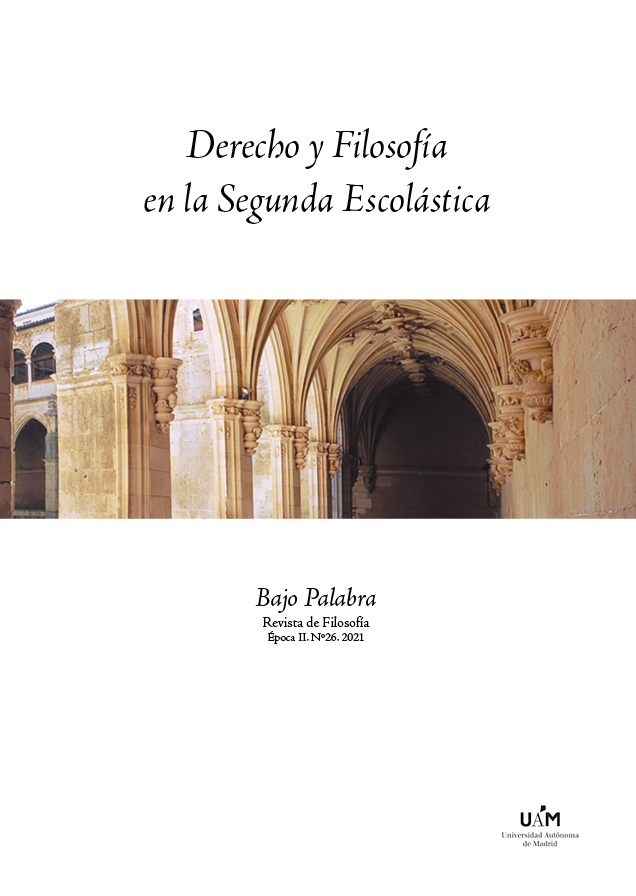The whole is greater than the sum of its parts: Suarez’s political theory and the social contract tradition
Keywords:
Social contract, Francisco Suarez, property, authority, ius gentiumCopyright (c) 2021 Daniel Loewe Henny, Felipe Schwember Augier

This work is licensed under a Creative Commons Attribution 4.0 International License.
Abstract
The present work attempts to place the political theory of Francisco Suarez in the social contract tradition and by so doing examine the general relationship between contractualism and natural law. It will argue that Suarez is a social contract theorist in a qualified sense of the term and in using that sense the work will show that there is complementarity rather than incompatibility between contractualism and natural law. Finally, it examines Suarez’s thesis on the emergent character of political power to suggest some points of difference with modern political theory.
Downloads
References
Buchanan, J. M. (2009). Los límites de la libertad. Entre la anarquía y el Leviatán (V. Sardón, Trans.). Madrid: Katz Editores.
Dworkin, R. (1984). Los derechos en serio (M. Guastavino, Trans.). Barcelona: Editorial Ariel.
Hernández-Fradejas, F. (2017). Derecho de propiedad privada y fiscalidad en Francisco Suárez. Anuario Filosófico, 50 (2), 269-296. https://doi.org/10.15581/009.50.2.269-296
Hobbes, T. (1992). Leviatán o la materia, forma y poder de una República eclesiástica y civil (M. Sánchez Sarto, Trans.). Buenos Aires: Fondo de Cultura Económica.
Hobbes, T. (2000). De Cive. Elementos filosóficos sobre el ciudadano (C. Mellizo, Trans.). Madrid: Alianza Editorial.
Kant, I. (1900). Gesammelte Schriften (Akademie-Ausgabe). Walter de Gruyter, Berlin.
Letelier Widow, G. (2018). La noción de "estado de naturaleza" en el pensamiento político español del siglo XVI. Ideas y valores, 67 (167), 199-222. https://doi.org/10.15446/ideasyvalores.v67n167.56033
Locke, J. (2000). Segundo tratado sobre el gobierno civil: un ensayo acerca del verdadero origen, alcance y fin del gobierno civil (C. Mellizo, Trans.): Alianza Editorial.
Nozick, R. (1988). Anarquía, Estado y utopía (R. Tamayo, Trans.): Fondo de Cultura Económica, Buenos Aires.
Rawls, J. (2002). La justicia como equidad. Una reformulación (E. Kelly Ed.). Barcelona: Paidós.
Rousseau, J.-J. (1998). Del contrato social. Discursos (M. Armiño, Trans.). Madrid: Alianza Editorial.
Schwartz Porzecanski, D. (2005). Francisco Suárez y la tradición del contrato social. Contrastes: revista internacional de filosofía (10), 119-138.
Suárez, F. (1965). Defensio fidei III. Madrid: Consejo Superior de Investigaciones Científicas.
Suárez, F. (1967). Las Leyes (J. R. E. Muniozguren, Trans.). Madrid Instituto de Estudios Políticos.
Tellkamp, J. A. (2014). Francisco de Vitoria and Luis de Molina on the Origin of Political Power. In A. Santiago Culleton & R. Hofmeister Pich (Eds.), Right and Nature in the First and Second Scholasticism. Derecho y Naturaleza en la primera y segunda escolástica (pp. 231-247). Bélgica: Brepols. https://doi.org/10.1484/M.RPM-EB.5.103152
